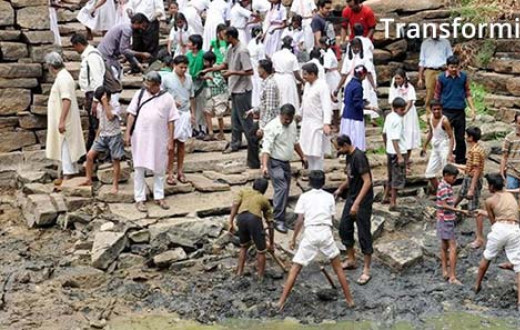Until 2016, addiction plagued the streets and homes of Lariapalli Panchayat, a group of nine villages and three hamlets in Odisha. Traditionally, the villagers produced and consumed country liquor. However, a simple tradition of having country liquor at celebrations had turned into raving addictions. The ones worst affected were the women and children of the panchayat, who at the hands of the addicted men of the village, had become victims of domestic violence and a careless environment respectively.
The menace was also causing less participation in development programs initiated by the government and a rise in instances of traffic accidents, kidney, lung and cardiac diseases.
Finding a ray of hope
Like many other women of the Panchayat, Prakashani Dhurva, a member of a women’s Self Help Group (SHG), wanted her husband to be free of addiction.
She soon found a way out of her misery when she, along with other members, of the Self Help Group was introduced to the de-addiction program led by the Vyakti Vikas Kendra India of The Art of Living. The program was a part of a bigger project of creating model gram panchayats and was a result of the intervention sought by The State Institute of Rural Development and Panchayati Raj (SIRD & PR) through an MoU (Memorandum of Understanding).
One of the first steps of the programs included mobilizing the community against the menace of addiction through meetings of different stakeholders and community empowerment programs called Nav Chetna Shivirs.
“When the members of the Self Help Group of the Gram Panchayat got to know about the de-addiction program, they wanted to contribute. So, they, along with our volunteers, helped in reaching out to owners of alcohol shops and bringing them to village meetings where we discussed the problem of addiction and ways to curtail it,” tells Padmini Badnayak, the district project coordinator of the program.

Women of Lariapalli GP discussing ways to battle the menace of addiction
The discussions eventually led to the closure of shops selling alcohol, which Prakashani believes led to her husband’s de-addiction.
Overcoming challenges
However, convincing liquor sellers to close down their shops was hard. Sellers resisted the idea of closing down their shops and fights between drunk men during the meetings were common.
“Convincing bhatti (local alcohol shop) owners and the regular addicts was not easy. But we held regular meetings where we highlighted the effects of addiction under which the panchayat was already reeling under. We just re-emphasized the effects: the loss of respect among family members, loss of peace at home and jeopardy to finances. With that, we were able to convince some of them. Eventually, some of the shop owners changed their profession and some who were from outside the panchayat were forced to move out,” tells Padmini.

Women of Lariapalli GP campaigning against addiction
Resolve of the villagers: The final push
The fight against de-addiction further pushed the villagers to take a strong step.
“In the gram sabha, 60 families agreed to stop consumption of alcohol. They consented to a fine that would be levied to people selling and consuming local country liquor,” tells Bolanath Jena, the project coordinator of the program.
“It was decided that those who want to drink could go outside the panchayat to drink,” adds Jena.
Prakashni, along with other members of the Self Help Group, helped by collecting the fine from the defaulters. Eventually, they collected an amount of Rs 75,000 from the fines and put it to good use by putting marble tiles on the walls and floor of the community baithak (sitting place).
The Nav Chetna Shivirs and satsangs added to the resolve of the villagers and also helped many addicts to reduce their intake of alcohol.
“With regular practice of the meditation I learned at the Nav Chetna Shivir, my drinking has reduced. Though, it has not stopped,” shares Rakesh Nayak, who was once an addict.
The efforts of the community finally paid results this year when it received the National Award for Prevention of Alcohol Abuse and Addiction by the government. The community had reduced its consumption from 2.4 quintals per day to zero.

Sarpanch of Lariapalli GP being presented the National Award for Prevention of Alcohol Abuse and Addiction by president Ram Nath Kovind
The reduction in alcohol consumption is already yielding results.
An increasing number of deaddicts and former liquor vendors started better interaction with government rural welfare schemes like the MGNREGS (Mahatma Gandhi National Rural Employment Guarantee Act). They began developing water harvesting structures to explore newer ways of engaging with the community and finding employment.
Interestingly, this observation was made by the SSEPD (Social Security and Empowerment of Persons with Disabilities Department), the department that aims to create well-being for vulnerable communities such as transgenders and victims of substance abuse.
“The villagers may not be earning as much as they used to when they were producing and selling liquor, but they are living with peace and happiness,” concludes Padmini.
(Source: Art of Living Bureau of Communication)
Written by Vanditaa Kothari













